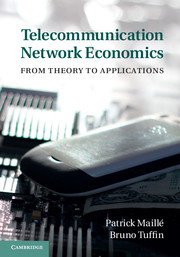Description
Telecommunication Network Economics
From Theory to Applications
Authors: Maillé Patrick, Tuffin Bruno
An up-to-date guide to the economic issues in telecommunications, delivering a comprehensive overview from mathematical models to practical applications.
Language: English
Subject for Telecommunication Network Economics:
Approximative price 103.03 €
In Print (Delivery period: 14 days).
Add to cart
Publication date: 02-2014
300 p. · 17.8x25.2 cm · Hardback
300 p. · 17.8x25.2 cm · Hardback
Description
/li>Contents
/li>Biography
/li>
Presenting a balance of theory and practice, this up-to-date guide provides a comprehensive overview of the key issues in telecommunication network economics, as well as the mathematical models behind the solutions. These mathematical foundations enable the reader to understand the economic issues arising at this pivotal time in network economics, from business, research and political perspectives. This is followed by a unique practical guide to current topics, including app stores, volume-based pricing, auctions for advertisements, search engine business models, the network neutrality debate, the relationship between mobile operators and mobile virtual network operators, and the economics of security. The guide discusses all types of players in telecommunications, from users, to access and transit network providers, to service providers (including search engines, cloud providers or content delivery networks), to content providers and regulatory bodies. Ideal for graduate students, researchers and industry practitioners working in telecommunications.
1. Introduction: telecommunications evolution and set of actors: 1.1 The evolution of telecommunications and the associated economic models; 1.2 Need for modeling and analysis; 1.3 Description of actors; 1.4 Goal of the book; 1.5 Outline of the book; 2. Mathematical foundations: optimization, game theory, auctions; 2.1 Basic economic theory; 2.2 Mathematical tools; 2.3 Game theory; 2.4 Mechanism design and auctions; 2.5 Conclusion; 3. Economics of access service providers: 3.1 History and evolution of access pricing models; 3.2 Expectations of users and ISPs, impact on other actors; 3.3 Flat-rate pricing; 3.4 Volume-based pricing; 3.5 Congestion and value-based pricing; 3.6 Economics of bundling; 4. Economics at the content and application level: 4.1 A bit of history; 4.2 Advertising; 4.3 Paid applications versus free applications with advertisement; 4.4 Economics of clouds/grids; 4.5 Economics of peer-to-peer systems; 4.6 Economics of content delivery networks; 5. Interactions among network service providers: 5.1 Introduction; 5.2 Auctions for wireless spectrum; 5.3 Competition between access providers; 5.4 Client but competitor: the (unsustainable?) situation of MVNOs; 5.5 Economics of interconnection; 5.6 Economics of community networks; 6. Interactions among content and application service providers: 6.1 Introduction; 6.2 Competition at the content level; 6.3 A specific case: competition between search engines; 6.4 Economic stakes of network security; 7. Relations between content/application providers and access service providers: 7.1 Evolution of economic relations between content/application and network providers; 7.2 Value chain, vertical integration; 7.3 Network neutrality issue; 7.4 Search neutrality.
Patrick Maillé has been an assistant professor at the Networks, Security and Multimedia Department of Telecom Bretagne since 2002. He has written or co-written more than 60 papers on game theory and economic concepts applied to telecommunication ecosystems.
Bruno Tuffin has been with INRIA in Rennes, France, since 1997. He has written or co-written more than one hundred papers and two books on Monte Carlo and quasi-Monte Carlo simulation techniques for the performance evaluation of telecommunication systems, and on developing new Internet-pricing schemes and telecommunication-related economic models.
Bruno Tuffin has been with INRIA in Rennes, France, since 1997. He has written or co-written more than one hundred papers and two books on Monte Carlo and quasi-Monte Carlo simulation techniques for the performance evaluation of telecommunication systems, and on developing new Internet-pricing schemes and telecommunication-related economic models.
© 2024 LAVOISIER S.A.S.




